#OldEnglish
Text
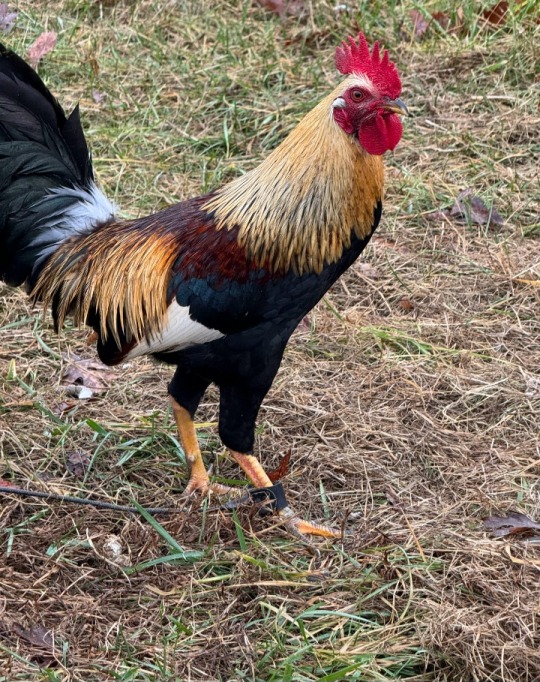
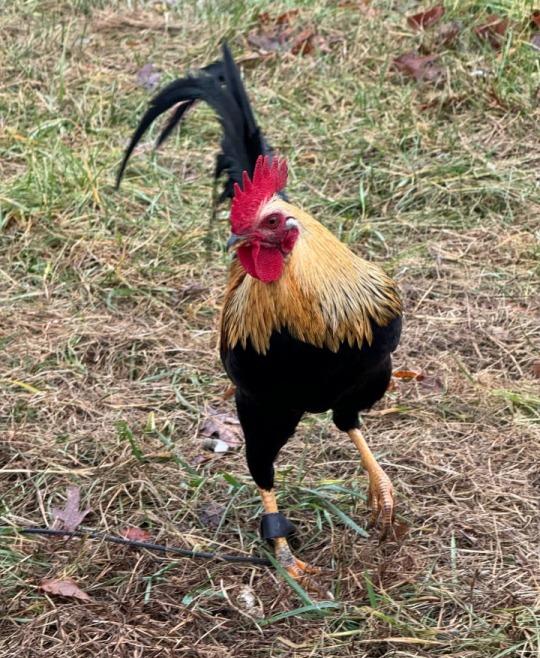
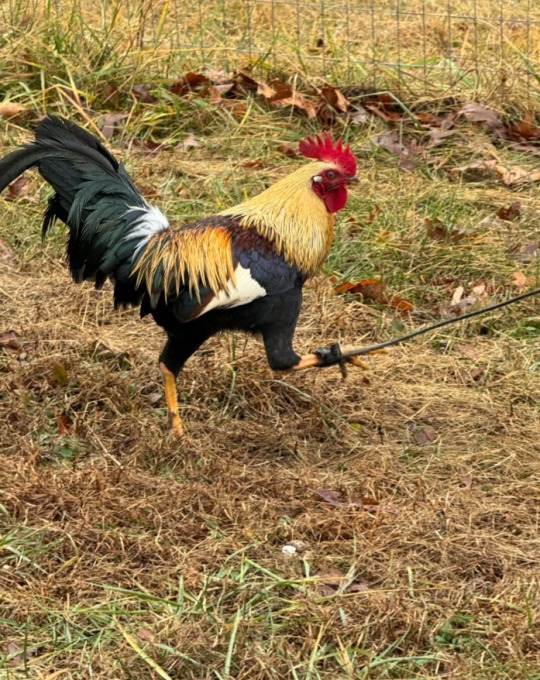
Old English stag is growing into a beautiful picturesque rooster. He's a scary cat but he's still young.
#oldenglish#oldenglishgamecock#cocky#rooster#chicken#cockyard#gamefowl#country#gamecock#farm#farmlife#rebelcountry#fightingrooster#sportrooster#homestead
10 notes
·
View notes
Text
Latin influence in the English Language
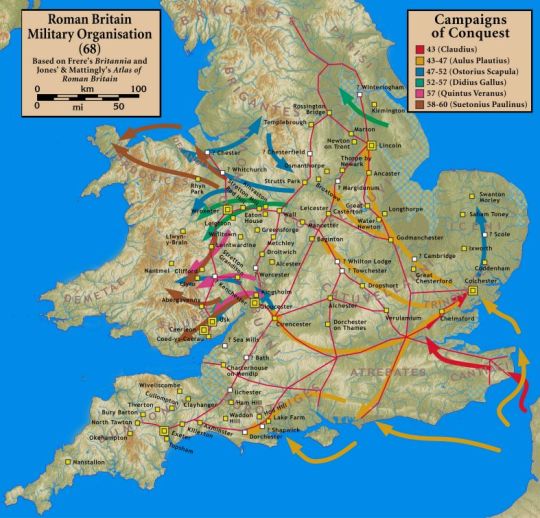

Latin influence on English
Latin influence in the English Language and vocabulary through the centuries. A computerised study and statistical analysis.
English belongs to the Anglo-Frisian group within the western branch of the Germanic languages, a subfamily of the Indo-European languages. It is related most closely to the Frisian language, to a lesser extent to Netherlandic (Dutch-Flemish) and the Low German (Plattdeutsch) dialects, and more distantly to Modern High German. Therefore English is a Germanic language, having a grammar and core vocabulary inherited from Proto-Germanic. However, a significant portion of the English word hoard comes from Romance and Latinate sources. Estimates of native words (derived from Old English) range from 20%–33%, with the rest made up of foreign borrowings. (These estimates, however, are based on the total raw counts of dictionary entries, where the frequency of use for most non-native words is low to nil.
The English vocabulary has increased greatly in more than 1500 years of development. The most nearly complete dictionary of the language, the Oxford English Dictionary (13 vol., 1933), a revised edition of A New English Dictionary on Historical Principles (10 vol., 1884-1933; supplements), contains 500,000 words. It has been estimated, however, that the present English vocabulary consists of more than 1 million words, including slang and dialect expressions and scientific and technical terms, many of which only came into use after the middle of the 20th century. The English vocabulary is more extensive than that of any other language in the world, although some other languages - Chinese, for example - have a word-building capacity equal to that of English.
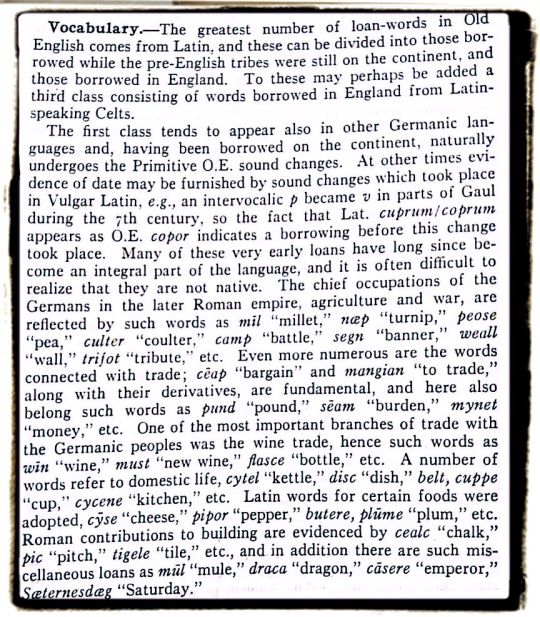
English and Latin
Extensive, constant borrowing from every major language, especially from Latin, Greek, French, and the Scandinavian languages, and from numerous minor languages, accounts for the great number of words in the English vocabulary. In addition, certain processes have led to the creation of many new words as well as to the establishment of patterns for further expansion. The true percent of native words used in everyday spoken and written English actually ranges from 75%–90%.
A large number of these borrowings come directly from Latin, or through one of the Romance languages, particularly Anglo-Norman and French, but some also from Italian, Portuguese, and Spanish; or from other languages (such as Gothic, Frankish or Greek) into Latin and then into English. The influence of Latin in English, therefore, is primarily lexical in nature, being confined mainly to words derived from Latin roots.
The number of Latin words, many of them derived from the Greek, that were introduced during the Old English period has been estimated at 140. Typical of these words are altar, mass, priest, psalm, temple, kitchen, palm, and pear. A few were probably introduced through the Celtic; others were brought to Britain by the Germanic invaders, who previously had come into contact with Roman culture. By far the largest number of Latin words was introduced as a result of the spread of Christianity. Such words included not only ecclesiastical terms but many others of less specialized significance.
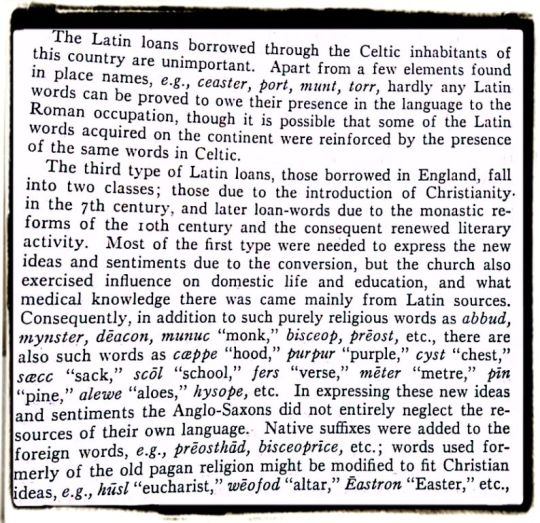
Latin and English
In the early part of the Modern English period the vocabulary was enlarged by the widespread use of one part of speech for another and by increased borrowings from other languages. The revival of interest in Latin and Greek during the Renaissance brought new words into English from those languages. Other words were introduced by English travelers and merchants after their return from journeys on the Continent. From Italian came cameo, stanza, and violin; from Spanish and Portuguese, alligator, peccadillo, and sombrero. During its development, Modern English borrowed words from more than 50 different languages.
For instance, the great poet John Milton, as a Renaissance man, was profoundly familiar with classical learning and his works abounds with classical references, which are often used to describe aspects of Christian belief. The wide use of classical and biblical sources is an important element of what is known as Milton's "Grand style". Other stylistic features contribute to the grandeur of Milton's epic poetry, epic simile for example is a technique he often employs following the Homeric and Virginian style. Another important element is the language he used. In keeping the high seriousness of his subject, he tended to use solemn and rather grandiose language, instead of plain simple English, so he often used words that derived from Latin or Italian, and also his syntax was heavily influenced by these two languages.
Word origins. A computerised survey of about 80,000 words in the old Shorter Oxford Dictionary (3rd ed.) was published in Ordered Profusion by Thomas Finkenstaedt and Dieter Wolff (1973) that estimated the origin of English words as follows:
Influences in English vocabulary Langue d'oïl, including French and Old Norman: 28.3%
Latin, including modern scientific and technical Latin: 28.24%
Germanic languages – inherited from Old English, from Proto-Germanic, or a more recent borrowing from a Germanic language such as Old Norse; does not include Germanic words borrowed from a Romance language, i.e., coming from the Germanic element in French, Latin or other Romance languages: 25%
Greek: 5.32%
No etymology given: 4.03%
Derived from proper names: 3.28%
All other languages: less than 1%
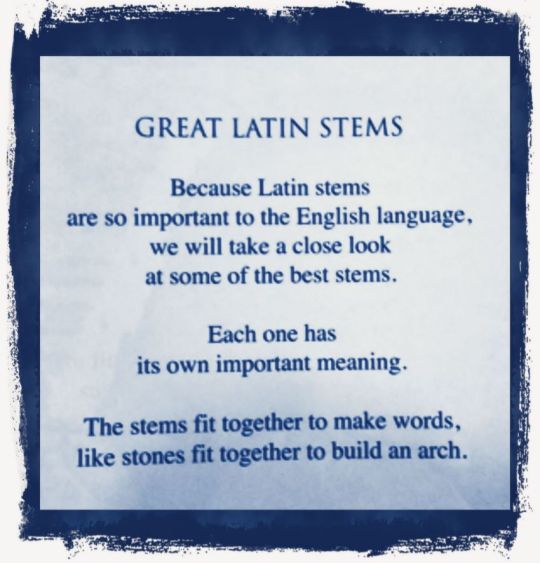
Latin influence on English
A survey by Joseph M. Williams in Origins of the English Language of 10,000 words taken from several thousand business letters gave this set of statistics:
French (langue d'oïl): 41%
"Native" English: 33%
Latin: 15%
Old Norse: 5%
Dutch: 1%
Other: 5%
Based on the above, the percentage of Latin words used in formal business context (15%) is substantially lower than that of the dictionary survey (28.24%) due primarily to the effects of linguistic register, where the vast majority of Latin words in English tend to be of a scientific or technical nature, or consist of words which are rarely to never used (i.e. are functionally obsolete).
Loanwords from Latin
The English language has borrowed extensively from the Latin language beginning during the Germanic period before English was English through the Old English period and up to the early Modern English period. The earliest Latin loanwords date from the period before the Germanic tribes invaded England under invite from the Britons. Latin borrowings continued throughout the Old and the Middle English period, above all Latin influenced the new English language thanks to the literary works of Geoffrey Chaucer, because he knew Latin, French and Italian and admired the main authors who wrote in these languages. English again borrowed heavily from Latin during the Early Modern period that coincides closely with the revival of learning of the Renaissance and with the great dynasties of Tudor (1485–1603) and Stuart (1603-1714) during which many scholars imported many Latin loanwords. Although English is a Germanic language, many common and everyday words are of Latin origin.

Latin influence on English
List of Latin Loanwords
With all the loanwords borrowed from Latin into English, an exhaustive list would be too lengthy to be possible. The following are some of the commonly used Latin loanwords in English:
Agile, abdomen, album, alien, anatomy, animate, animosity, anchor, annual, apostle, area, audio, bacteria, bonus, bovine, butter, Caesar, cancer, canine, capsule, cervix, chalk, cheese, circle, circus, city, civil, chest, church, comet, compensate, color, colossus, complex, consider, contemplate, data, decide, dexterity, deity, discus, disc, disciple, dish, disk, domestic, ego, emperor, equilibrium, erupt, et cetera, excavate, expensive, fauna, feline, feminine, fictitious, flora, floral, formula, fungus, general, genius, genus, gradual, habitual, habitat, honor, id, ignite, immoral, immortality, inertia, infinite, ingenious, insane, interim, janitor, judge, kettle, kitchen, lachrymose, latex, legal, libido, lingua franca, literature, lunar, manual, master, martyr, media, meditate, memento, memorandum, memory, mile, minus, moment, momentum, moral, noble, nocturnal, notorious, opera, orbit, ovum, paper, patron, pauper, pavement, pendulum, peninsula, pepper, percent, persona, physician, plus, pound, propaganda, referendum, regal, revise, rural, sack, series, sex, sickle, similar, simile, status, stimulus, street, subpoena, superego, superintendent, tabula rasa, temple, title, ultimate, vehicle, verbatim, vertigo, vice versa, video, vindicate, wall, wine.
Learn more visiting these useful websites:
https://www.latin-english.com Latin English Dictionary
https://www.etymonline.com Online Etymology Dictionary
You can download the following books on Latin at this page:
Latin Language: Bennett, Charles E.: New Latin Grammar;
D'Oogle, Benjamin L.: Latin for beginners;
Wine, women and songs. Medieval Latin Student's Songs, including translation and commentary by John Addington Symonds.
Or read other articles about the English Language and Literature:
Christianization of Britain, a full article
English, Greek and Latin, a complete article
The Latin Language, a short history
Italian influence on English
English Renaissance, the revival of learning
Short History of the English Language
The essence of English Grammar
Language and grammar
In defence of grammar
The importance of grammar
Short History of the Origin of English
English words origin and vocabulary
History-of-the-English-Language.pdf
British-history-milestones-synthesis
Questions-about-the-english-language
History-of-English-Literature-Summaries.pdf
British_literature_history_chart_summary.htm
General_literature_history_chart_summary.htm
American_literature_history_chart_summary.htm
British_english_history_timeline.htm
http://www.youtube.com/watch?v=_6eYkDhH61Y
More videos;
Latin, the key to English
Latin influence on English
Latin and Greek roots
Read the full article
#Anglo-Norman#dictionary#English#entries#French#germanic#language#latin#loanwords#OldEnglish#OldNorman#Oxford#Romance#words
5 notes
·
View notes
Photo

And now for something completely different. Olde English Style dogs. #dog #oldenglish #fun #silly #midjourney follow for more. (at Denver, Colorado) https://www.instagram.com/p/CmRseeiOH9y/?igshid=NGJjMDIxMWI=
5 notes
·
View notes
Photo

The brand new look of our creative house Underwood Design for 2023 & beyond! #logo #graphicdesign #designhouse #fashionhouse #streetwear #oldenglish #punkrock #skateboarding #indie #filmmaker #newyear #branding #hiphop #culture #chicago #losangeles #hollywood #dtla (at Chicago, Illinois) https://www.instagram.com/p/CmwiZ56rUkz/?igshid=NGJjMDIxMWI=
#logo#graphicdesign#designhouse#fashionhouse#streetwear#oldenglish#punkrock#skateboarding#indie#filmmaker#newyear#branding#hiphop#culture#chicago#losangeles#hollywood#dtla
2 notes
·
View notes
Photo

It’s been a privilege and an honour to see the Lindisfarne Gospels in the flesh. @laingartgallery has a phenomenal exhibit featuring this national treasure and it is well worth the visit. The Viking attack on Lindisfarne was the inspiration behind my track “Lindisfarnee”. The lyrics are entirely in Old English and is an account of the sacking of Lindisfarne in 793. The link to the track can be found below and on the Dwarrowdelf Records Bandcamp page. https://youtu.be/45AkMWofeTk #musiciansofinstagram #blackmetal #lindisfarne #lindisfarnegospels #viking #oldenglish #britishhistory #inspired #metalhead #headbanger #bandcamp #itunes #youtube #spotify #metalmusic #blackmetalvocalist #musician #music #release #track https://www.instagram.com/p/CkBKo0_sHQs/?igshid=NGJjMDIxMWI=
#musiciansofinstagram#blackmetal#lindisfarne#lindisfarnegospels#viking#oldenglish#britishhistory#inspired#metalhead#headbanger#bandcamp#itunes#youtube#spotify#metalmusic#blackmetalvocalist#musician#music#release#track
2 notes
·
View notes
Photo

#lettering #oldenglishtattoo #oldenglish #scripttattoo #script #tattoo #tattooartist #letters #chicanolettering #tattooletters #newcastleunderlyme #stokeontrent #staffordshire #staffordshiretattoo #stokeontrenttattoo #keele #keeletattoo #handtattoo #lovetattoo #knuckletattoo (at Newcastle under Lyme) https://www.instagram.com/p/Ci75g8GDc4H/?igshid=NGJjMDIxMWI=
#lettering#oldenglishtattoo#oldenglish#scripttattoo#script#tattoo#tattooartist#letters#chicanolettering#tattooletters#newcastleunderlyme#stokeontrent#staffordshire#staffordshiretattoo#stokeontrenttattoo#keele#keeletattoo#handtattoo#lovetattoo#knuckletattoo
1 note
·
View note
Photo
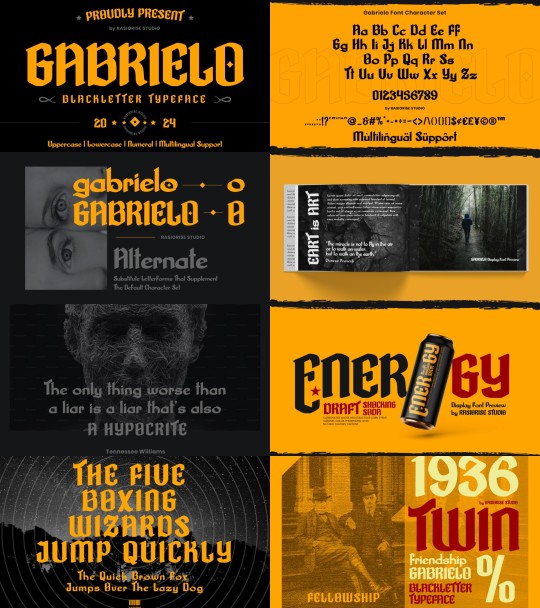
Gabrielo is a sans-serif blackletter typeface inspired by Old English fonts with a modern bold style, suitable for logos, headlines, and various print materials.
Link: https://l.dailyfont.com/KPkH1
#aff#Typography#Design#Font#Inspiration#GraphicDesign#Logo#Branding#Creativity#Artistic#Unique#StyleGuide#FontFrenzy#TypeDesign#VisualIdentity#Minimalism#BoldFont#Serif#SansSerif#BlackLetter#OldEnglish#ModernTypography
1 note
·
View note
Text
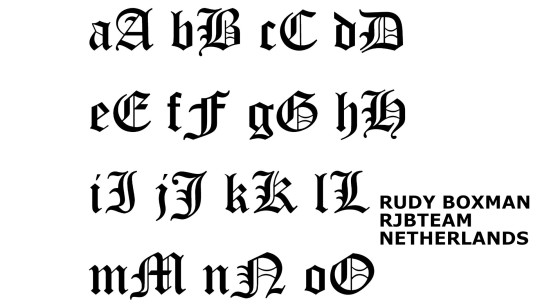
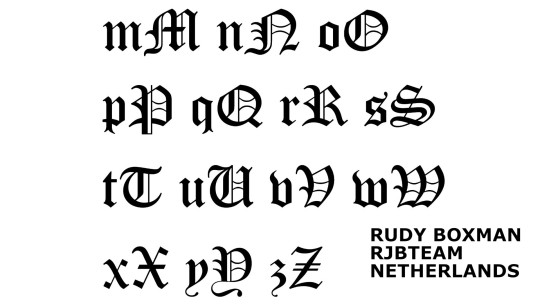
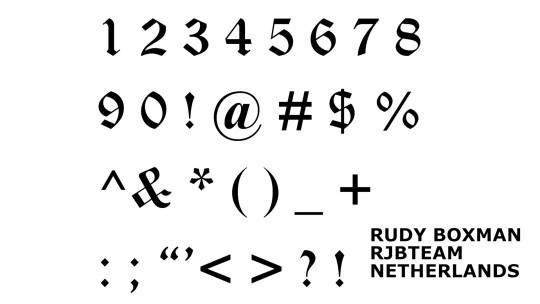



Rudy Boxman created an OLD ENGLISH TEMPLATE for people who love to create OLD ENGLISH TEXTURES #OldEnglish #Template #news #UK #England #text #texture #textures #HD #HighDefinition 1920x1080 #RudyBoxman #RJBTEAM #PENCIL #Word #Nieuwsuur #TAAL
OLD ENGLISH OLD ENGLISH OLD ENGLISH
#Rudy Boxman created an OLD ENGLISH TEMPLATE for people who love to create OLD ENGLISH TEXTURES#OldEnglish#Template#news#UK#England#text#texture#textures#HD#HighDefinition 1920x1080#RudyBoxman#RJBTEAM#PENCIL#Word#Nieuwsuur#TAAL#OLD ENGLISH OLD ENGLISH OLD ENGLISH#design#designer#worldnews#tshirtdesign#tshirtprinting#science#christmas
0 notes
Text
Word of the Day!
Today’s word of the day… Werifestria.
Image is of a woman dressed in green with wings, holding a bird while standing in a shallow creek. Text reads: Werifestria. Old English (v.) To wander lovingly through the forest in search of mystery.
I absolutely don’t do this….
That’s a lie. And I think the word adds magic to the mystery, and to the act of wandering. This image reminds me of a dream I…

View On WordPress
0 notes
Photo

#designinspirations #oldenglish #typography #lifestylephoto #cre8 #designers #vintageaesthetic #weekend #vibeandmood #docmartenstyle #leatherjackets #blkwht #artistlife #silverjewelry https://www.instagram.com/p/Cn_LRWgs8wu/?igshid=NGJjMDIxMWI=
#designinspirations#oldenglish#typography#lifestylephoto#cre8#designers#vintageaesthetic#weekend#vibeandmood#docmartenstyle#leatherjackets#blkwht#artistlife#silverjewelry
0 notes
Photo
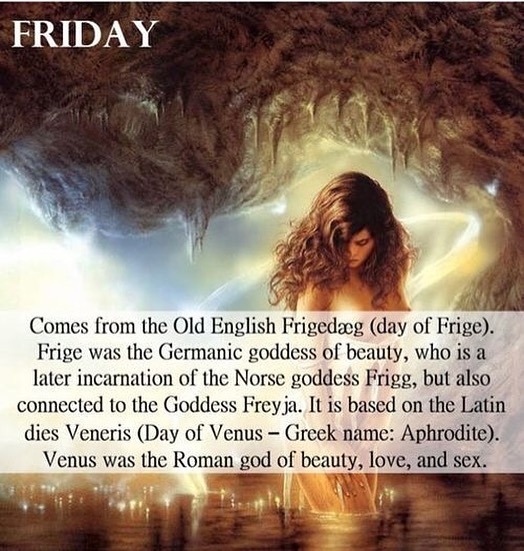
Friday Fun Fact: #norsemythology #norsegoddess #oldenglish #fridayfunfact #mythology https://www.instagram.com/p/Cn7NeY5pobR/?igshid=NGJjMDIxMWI=
0 notes
Photo

Good morning to the 2021 #champ #embroidery, #steamers #oldenglish #fonts (at Anne's Embroidery) https://www.instagram.com/p/CnrupqPO8Wz/?igshid=NGJjMDIxMWI=
0 notes
Text
Questions about the English Language
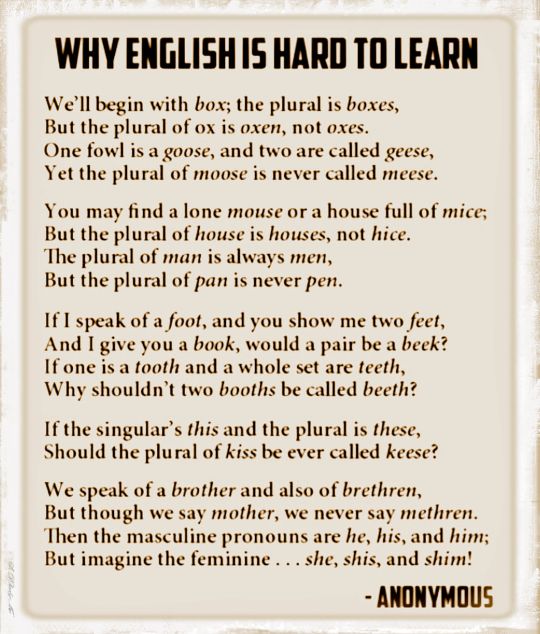
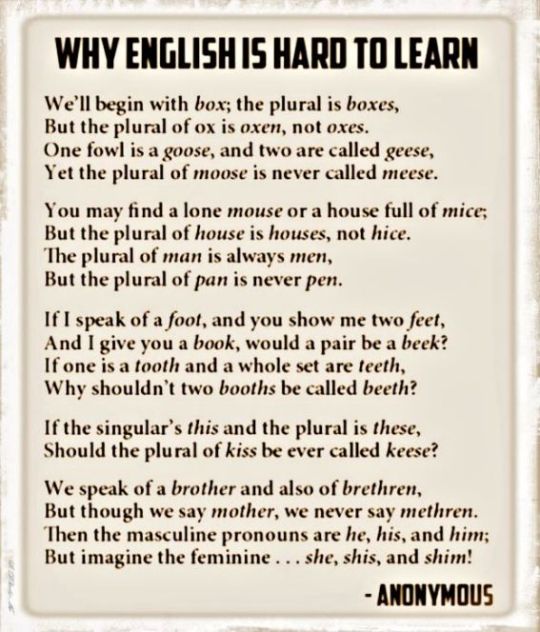
Questions about the English language
Questions about the English Language, its origin, history and development, its major events and the reasons why it is so difficult to learn and to speak
1) What was the first Indo-European language to be spoken in Britain?
The first people in Britain about whose language we have definite knowledge are the Celts. Celtic was, therefore, presumably the first Indo-European language to be spoken in the country we now know as England.
2) What were the Teutonic tribes that settled in Britain after the Romans had left it?
The Teutonic tribes which settled in Britain after the Romans had left it, were the Jutes, Saxons and Angles.
3) Where did the Jutes, Angles and Saxons come from?
Before crossing over to Britain, the Jutes and the Angles most probably had their home in the Danish peninsula; the Jutes in the northern half (hence the name Jutland) and the Angles in the South. The Saxons were settled to the south and west of the Angles, roughly between the Elbe and the Ems.
4) Where did these tribes settle?
First came the Jutes who settled in Kent, then, according to the Anglo-Saxon Chronicle, the Saxons who settled in Sussex and Wessex. Finally the Angles who occupied the east coast and then established an Anglian Kingdom north of the Humber.
5) What are the main periods in the development of English?
The English language of today is the language which has resulted from the fusion of the dialects spoken by the Jutes, Saxons and Angles. In the development of English, we generally distinguish three main periods. The period from 450 to 1150 is known as Old English. From 1150 to 1500 the language is known as Middle English. The language from 1500 to the present time is called Modern English.
6) What event is commonly considered to mark the beginning of the Old English period?
The invasion of England by Germanic tribes, notably the Angles, Saxons, and Jutes in the 5th century, marked the beginning of the Old English period.
7) Which famous medieval document played a significant role in shaping the English language during the Middle English period?
The Magna Carta, signed in 1215, played a significant role in shaping the English language during the Middle English period, as it was one of the earliest legal documents written in English rather than Latin or French.
8) Who is often credited with the translation of the Bible into English, contributing significantly to the standardization of the language?
The translation of the Bible into English by John Wycliffe in the 14th century is often credited with contributing significantly to the standardization of the English language.
9) What major historical event had a significant impact on the English language, leading to the borrowing of many French words into English?
The Norman Conquest of England in 1066 had a significant impact on the English language, leading to the borrowing of many French words into English.
https://www.youtube.com/watch?v=r9Tfbeqyu2U
10) During which period did English start to emerge as a global language due to British colonial expansion?
English started to emerge as a global language during the Early Modern English period, particularly during the Age of Exploration and British colonial expansion from the 16th century onwards.
11) What influential English writer is often referred to as the "Father of the English Language"?
Geoffrey Chaucer, the author of "The Canterbury Tales," is often referred to as the "Father of the English Language" due to his significant contributions to English literature during the Middle English period.
12) What linguistic event occurred in the 15th century that marked the transition from Middle English to Early Modern English?
The Great Vowel Shift, a series of changes in the pronunciation of English vowels, occurred in the 15th century, marking the transition from Middle English to Early Modern English.
13) What has been the influence of the Bible on the English language?
The Bible has had a significant impact on the English language, particularly during the Middle English period when it was translated into English by figures such as John Wycliffe and later by the King James Version translators. The translation of the Bible into English helped to popularize the language among the masses and contributed to its standardization.
14) What has been the influence of Shakespeare's works on the English language?
Shakespeare is often credited with contributing a vast number of words and phrases to the English language, estimated to be around 1,700 words according to some sources. His plays and poetry have introduced countless idioms, expressions, and linguistic constructions that have become ingrained in the English lexicon. Additionally, Shakespeare's works have helped to standardize English grammar and vocabulary during the Early Modern English period.
15) What influential dictionary, first published in the 18th century, played a crucial role in standardizing English spelling and usage?
Samuel Johnson's "A Dictionary of the English Language," first published in 1755, played a crucial role in standardizing English spelling and usage.
16) Which two Germanic tribes had the most significant influence on the development of Old English?
The Angles and the Saxons had the most significant influence on the development of Old English.
17) What modern English dialect evolved primarily from the English spoken by early settlers in the American colonies during the 17th and 18th centuries?
American English evolved primarily from the English spoken by early settlers in the American colonies during the 17th and 18th centuries.
18) Why do you think the English language is so difficult to be learned well?
Because it has an extremely rich vocabulary, an irregular spelling system and a lot of idiomatic usages. As a matter of fact those five hundred words an average Englishman uses are far from being the whole vocabulary of the language. You may learn another five hundred and another five thousand and yet another fifty thousand and still you may come across a further fifty thousand you have never heard of before.
https://www.youtube.com/watch?v=MqqlSb9uGUQ
To learn, to practice and to improve the English Language, the Use of Internet and Marketing Strategies write us, we can guarantee free advice, good tricks, useful cooperation, lot of materials and ideas. Find out more at the following links:
The English Language ;
The English language article ;
History of English ;
Short history of English ;
Diffusion of English ;
The blend of English ;
The power of English ;
The world of English ;
The world of English language ;
English words origin and vocabulary ;
Language and grammar ;
English Resources ;
George Mikes on English ;
English Literature ;
English History ;
Celtic languages ;
Questions on Colonialism ;
Language and Thought ;
Languages of the world ;
English the world language ;
On Facebook ;
World of English ;
Read the full article
#Angles#Bible#Britain#Chaucer#English#idioms#Indo-European#Johnson#Jutes#language#MagnaCarta#MiddleEnglish#ModernEnglish#OldEnglish#questions#Romans#Samuel#Saxons#Shakespeare#Shift#spelling#usage#vowel
0 notes
Photo

A bonus Olde English Dog. Enjoy. #oldenglish #dog #fun #silly #midjourney (at The British Players) https://www.instagram.com/p/CmSqlScD62F/?igshid=NGJjMDIxMWI=
3 notes
·
View notes
Photo

Castillo #lettering #letteringtattoo #oldenglish #type #chicanolettering #castillo https://www.instagram.com/p/Cnf81rYsi4X/?igshid=NGJjMDIxMWI=
0 notes
Photo
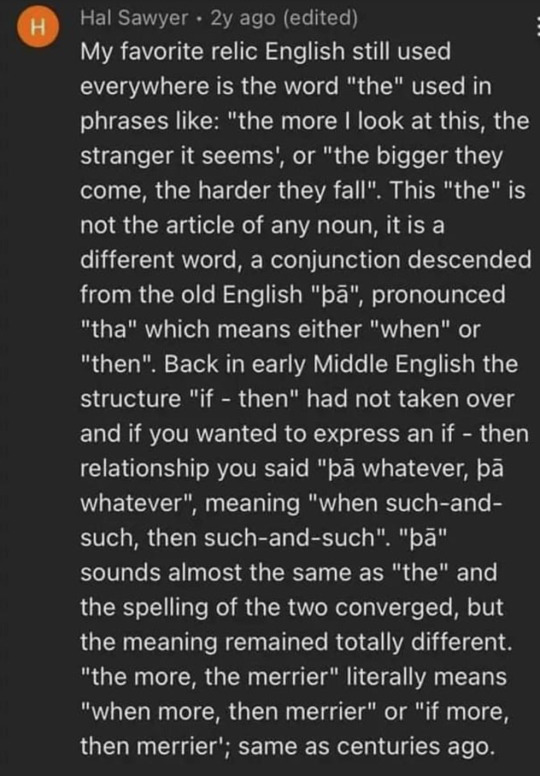
This is so cool!
5 notes
·
View notes